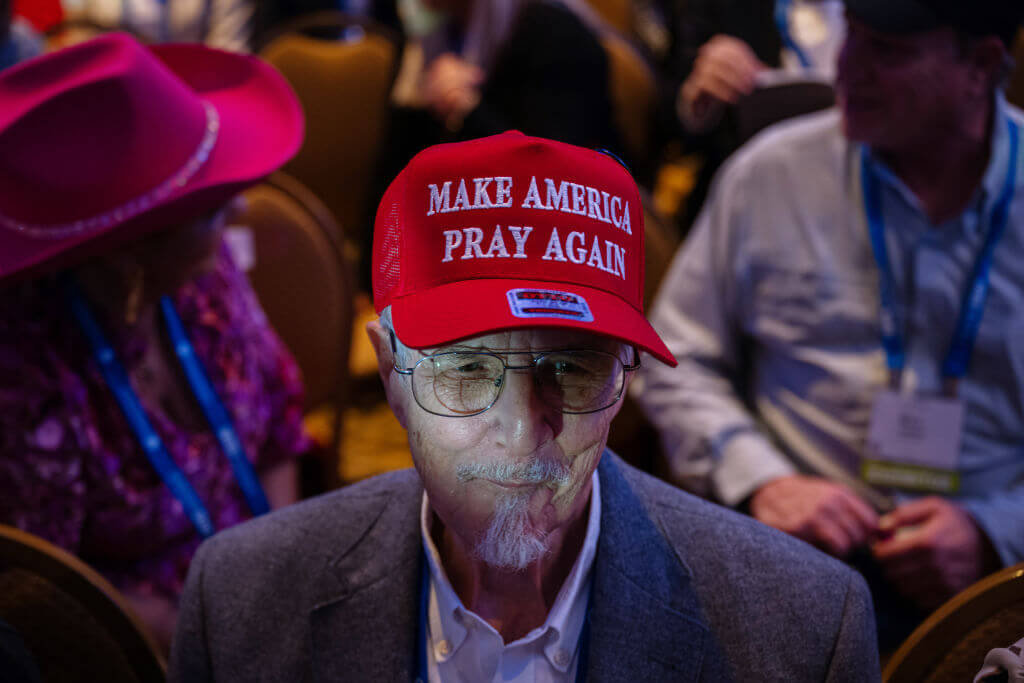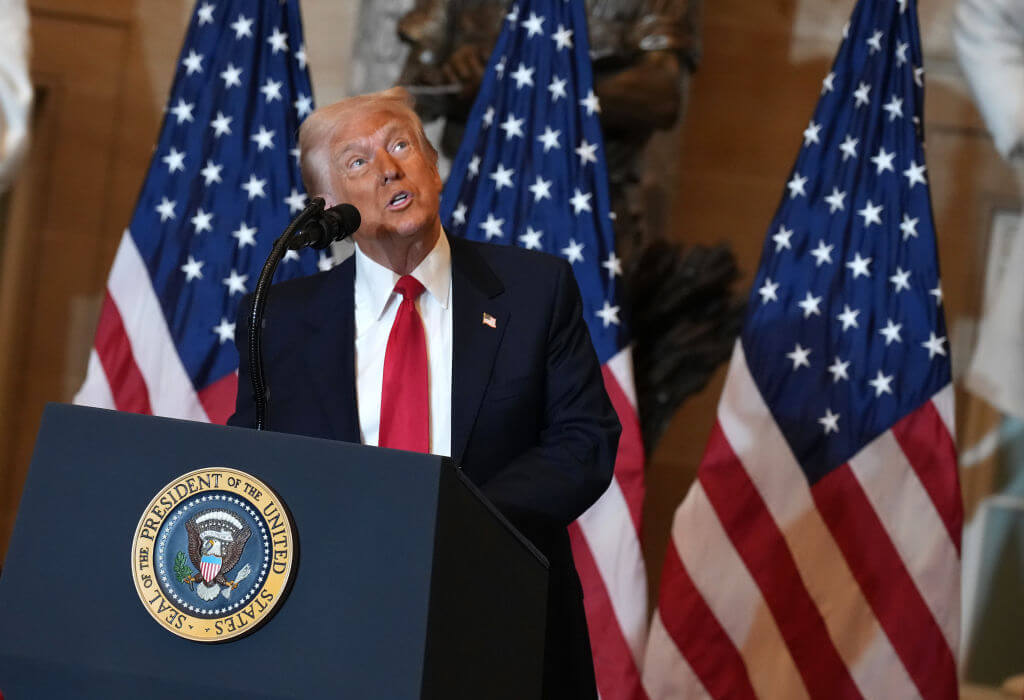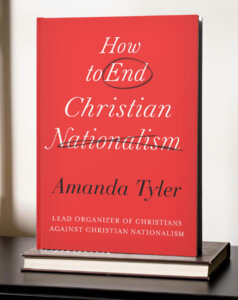Christian nationalism is rising. So is the Christian resistance
‘It’s a gross distortion of the teachings of Jesus,’ said one advocate

An attendee at a Christian conference in Nashville where Donald Trump was speaking wears a “Make America Pray Again” hat in February 2024. Photo by Jon Cherry/Getty Images
Amanda Tyler didn’t need President Donald Trump to tell her that Christian nationalism was on the rise. She had seen it reshape churches, rewrite textbooks and realign politics.
But when Trump took the podium last month for his second inaugural address, claiming divine intervention in the assassination attempt — “I was saved by God to make America great again” — she saw something even more unsettling.
The standing ovation.
It wasn’t just applause for a president. It was a moment of ecclesiastical fervor, a collective confirmation that America had not just an elected leader, but an anointed one.
Tyler, a lifelong Baptist and executive director of the Baptist Joint Committee for Religious Liberty, was unsettled but unsurprised. She is leading a growing movement within Christianity that is resisting Christian nationalism — not from the outside, but from inside the church itself. “We’re disgusted to see our faith being used to justify discriminatory policies of all kinds,” Tyler said in an hourlong phone conversation.
A fight from within
Christian nationalism — the idea that America was founded as a Christian nation and should be governed accordingly — has always been woven into the country’s DNA. But in recent years, it has moved from the margins to the mainstream, carried by Trump’s presidency and a base that sees his political survival as divinely ordained.
For decades, opposition to Christian nationalism came mostly from secular organizations, civil rights groups and religious minorities. Now, Christians themselves are leading the charge.
Across denominations — Baptists, Methodists, Presbyterians, and even conservative evangelicals — a coalition of faith leaders is pushing back against a movement they believe is not just a political threat, but a theological one. They argue that Christian nationalism doesn’t just corrupt democracy; it corrupts Christianity.

Tyler’s campaign, Christians Against Christian Nationalism, has drawn over 40,000 signatories, many from churches that once considered themselves apolitical. Her position, she believes, carries unique weight. “Our Jewish and Muslim colleagues tell us, ‘You can speak with more authority on how Christian nationalism is not reflective of Christianity.’”
For Tyler, 47, the fight is also personal. She is married to a Jewish man, and together they are raising their son in an interfaith household. “I feel a different sense of vulnerability for them than I do for myself,” she said.
That vulnerability has been heightened by the growing push to codify Christian nationalist ideas into law. She has seen firsthand how Christian privilege manifests in ways that marginalize others. “It’s a form of othering,” she said, pointing to the fact that public schools close for Christian holidays but not for Jewish or Muslim ones.
Texas as a test case
The push to codify Christian nationalism into law is accelerating. Texas, where Tyler lives and fights these battles daily, has become a proving ground.
In 2021, the state passed a law requiring public schools to display donated “In God We Trust” posters. Two years later, lawmakers approved unlicensed religious chaplains to counsel students.
Now, Lt. Gov. Dan Patrick wants to mandate the Ten Commandments in every classroom, a proposal modeled after a Louisiana law that has already been blocked in federal court. In Oklahoma, parents are suing the state superintendent — the son of a Christian minister — for ordering schools to teach the Bible.
Last fall, Tyler joined Jewish community leaders to challenge the Texas State Board of Education’s decision to infuse Bible lessons into subjects as varied as math and poetry with their Bluebonnet curriculum. The board approved Bluebonnet by a single vote.
Mark Chancey, a professor of religious studies at Southern Methodist University, has seen these battles escalate. “If the public school can play religious favorites,” he said, “then my tradition might benefit this week and be demonized next week.”
Chancey, a United Methodist who also works with Christians Against Christian Nationalism, added: “Christians differ theologically among themselves. The schools might not teach the Bible stories the way that parents would like.”

From the pulpit to the White House
The movement is no longer just shaping school curriculums — it is influencing federal priorities.
A 2023 poll found that 52% of Americans who attend religious services weekly either identify as Christian nationalists or sympathize with the movement; a separate survey the year before showed 45% think the U.S. should be a Christian nation. Now, with Trump’s return to power, those numbers aren’t just statistics; they are a governing blueprint.
The ideological framework for much of this agenda is detailed in Project 2025, a conservative guidebook that overlaps significantly with Christian nationalist priorities. It calls for aggressive immigration crackdowns, the rollback of LGBTQ+ rights, and bans on abortion and pornography. These policies are designed to enshrine biblical principles and a particular moral order into law.
Several high-profile lawmakers have openly embraced Christian nationalism. Reps. Lauren Boebert and Marjorie Taylor Greene wear the label proudly. House Speaker Mike Johnson promotes many of its tenets. Pete Hegseth, Trump’s new Secretary of Defense, sports tattoos inspired by the Christian Crusades (the medieval wars against Muslims).

Jesus as ‘political mascot’
The belief that America was divinely chosen has deep roots. Political leaders in the early 1800s mythologized the Founding Fathers as quasi-prophetic figures, with George Washington often recast as a Moses-like prophet. During the Cold War, as the United States sought to distinguish itself from the “godless” Soviet Union, Congress added “under God” to the Pledge of Allegiance and declared “In God We Trust” the national motto.
But this moment feels different for Tyler. She believes Christian nationalism now poses an existential threat to American democracy itself. She argues that it undermines pluralism and twists religion into a tool of power. “It’s a gross distortion of the teachings of Jesus,” she said. “Jesus was all about love — loving our neighbors, loving everyone without regard to difference. Christian nationalism takes Jesus and turns him into a political mascot.”
Despite being the dominant religious group in the country — 68% of Americans who identify with a religion are Christian, as have been all 45 U.S. presidents — Christian nationalists insist they are under attack as an embattled minority.
“It isn’t logically consistent,” Tyler said, exasperated. “One can’t both be a majority faith in the country and also be a persecuted minority.”
A test for religious freedom
Now, that belief in persecution is shaping federal policy. This month, Trump announced a new federal task force to “eradicate anti-Christian bias,” led by Attorney General Pam Bondi. Critics say the initiative is more about advancing Christian nationalism than protecting religious freedom.
“If Trump really cared about religious liberty,” said Rachel Laser of Americans United for Separation of Church and State, “he’d be addressing antisemitism in his inner circle, anti-Muslim bigotry, and hate crimes against religious minorities.”
Tyler, meanwhile, sees the political contradictions. “I’m concerned about how this task force could be weaponized to enforce a particular religious viewpoint by the government,” she said. She finds it hypocritical that this initiative is happening at the same time the administration is dismantling diversity, equity and inclusion offices under the guise of eliminating bias.
A test of church and state separation
For many, opposing Christian nationalism is not just a political stance — it is a theological necessity. Tyler knows that many American Christians see no contradiction between their faith and politics. That’s why she tries to meet them with empathy.

“It’s important to resist and reject Christian nationalism as an ideology,” she said, “without demonizing individuals who hold to some of its principles.”
She sees her new book, How to End Christian Nationalism, as both an extension of her faith and a call to action. The founders, she argues, got it right. “The best arrangement, the arrangement that they chose, was to disestablish religion,” she said. “To be sure that the government would not take sides when it comes to picking between religions, or even picking religion over no religion.”
As Trump embarks on his second term, Tyler believes the next four years will test the strength of the separation of church and state. “I think all Americans, regardless of religious belief, should defend free speech and freedom of religion in these moments,” she said. “But also religious leaders and communities really need to have the courage to continue to speak from their traditions, including when it’s unpopular or challenging of power.”

















